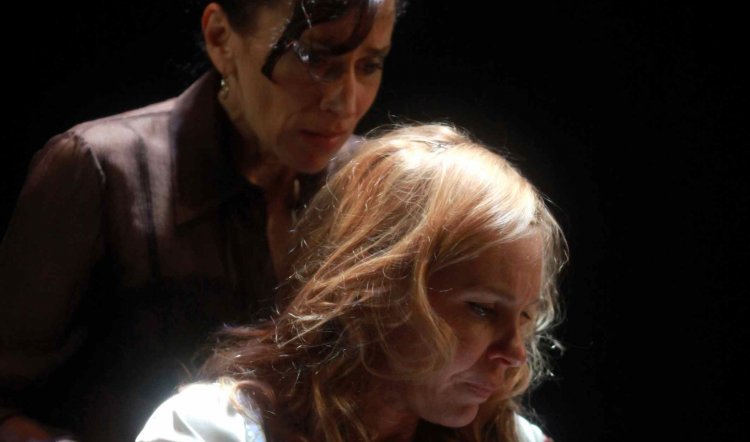
THE DUCHESS OF MALFI
THE DUCHESS OF MALFI, Bell Shakespeare Company in the Playhouse at the Sydney Opera House, 11 July-5 August 2012. Photos by Rush - Lucy Bell and Lucia Mastrantone.
In their program notes for this production, the play's adapters Hugh Colman and Ailsa Piper write that as they pared back the original sprawling text with its subplots, digressions and many (20ish) characters, they saw this of its essence: "…the closer one gets to power, the more difficult it becomes to resist corruption…" It's a truism with which many of us are all too familiar as we watch politicians and businesspeople claw their way ever upwards. Nevertheless, this adaptation, originally titled - appropriately - Hellbent and produced by Melbourne's Red Stitch in 2006, recasts the idea with awful vividness. It really does seem that the nicest, most well-intentioned and least venally-inclined will eventually turn vicious if fed enough power. So those possessed of normal levels of greed, ego and ambition stand no chance at all: their motives and journey are indeed, hellbent.
In John Webster's play of 1612, the young Duchess (Lucy Bell) is a widow and her brothers, the Cardinal and the Judge, intend her to stay that way. If she remarries they will lose the wealth and social position they enjoy because her new husband and any male offspring will precede them. There is also a strong suggestion that the Judge has feelings for his sister that his brother the Cardinal should strongly condemn, if the holy gent could ever keep his pants up and cassock down long enough to recall God's views on incest. Unknown to them, however, the Duchess has fallen in love with and secretly married her steward Antonio (Matthew Moore), witnessed only by her companion Julia. One wouldn't have to be a student of history and Euro-politik to deduce that the Duchess has signed her own death warrant.
The editing of the play from three-plus hours to 110 uninterrupted minutes intensifies the drama and compresses the passage of time to a degree that could easily be disastrous in lesser hands, turning drama to melodrama and the timeline to nonsense. However, designer Stephen Curtis drops the emotional temperature and concentrates the attention with a simple setting of black angular walls that silently open and close to allow entrance and exit. In the centre of this space is a large, circular white leather ottoman beneath an unearthly blue lit shaft of similar circumference. Its opening hints at the possibility of Heaven or the nothingness of Purgatory, depending on the circumstances and one's imagination. Alan John's terrifically well judged and minimal electronic soundscape underscores this sense.
For his part, director John Bell avoids the hazards of gigglesome melodrama by maintaining the distancing effect of chilly atmosphere; and a bright clear focus on each of the six actors and the text. Julia is actually an amalgamation of two characters: the Duchess's lady Cariola and the Cardinal's mistress. It's a successful move and Lucia Mastrantone is a bright point of sassy sexiness, worldly knowingness and poignant gal pal-ness in a world that is otherwise darkly dangerous for women of all ranks.

Her plight and that of her mistress is made abundantly clear in the behaviour of the Cardinal and the Judge. David Whitney is an imposing presence as the Man of God who is also a licentious rootrat. His outward calm and authority cast an uneasy shadow that shimmers with barely suppressed rage and disdain for lesser mortals (particularly the irresistible Julia). He is as formidable as his brother is not. As the Judge Sean O'Shea is physically lithe and feline. Luscious long hair somehow symbolises the vanity and weakness at the heart of his increasingly unhinged actions in the face of his sister's "betrayal."
In their adaptation Piper and Colman have brought to the fore a character whose place in the drama and in society is pivotal, and that's the assassin Bosola. Ben Woods is a striking presence: a golden bear in stature, a salt-of-the-earth, roughly spoken but loyal servant. Hired by the brothers to murder their sister, Bosola's attitude towards the Duchess is the closest she comes to humanity and tenderness in her short life. Their big scene together is grotesquely illuminating and beautiful.
Despite the re-engineered focus on Bosola, the night nevertheless belongs to Lucy Bell. She is a glowing, life-affirming presence as the young woman in love. Then, as her fate looms ever more inevitably, the complexity of her character grows. Her hopeless hopes and girlish dreams give way to disbelief and sorrow, and finally to nobility and courage in the face of what lies ahead. Hers is a fine performance, full of nuance, light and shade; she is Everywoman from any age. And this production deserves her - its clarity, poetry and essential truths are as absorbing as one could hope for; it would be difficult to wish for more.



